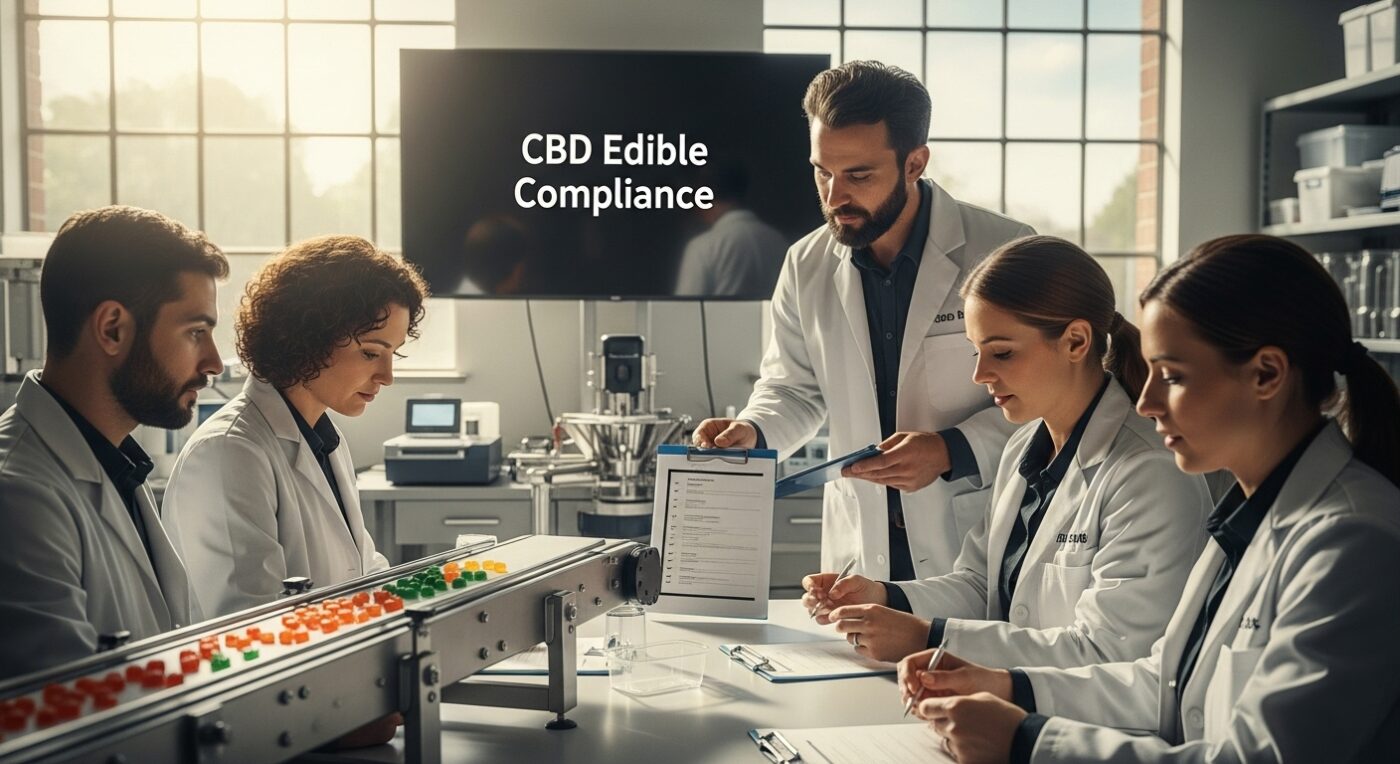Blog
Understanding CBD Edible Compliance Explained
CBD edibles have exploded in popularity and are now showing up everywhere from local coffee shops to national grocery chains. Yet behind the colorful packaging and tasty flavors sits a complicated legal web. The FDA still does not approve CBD as a food ingredient or dietary supplement. Most people think the rules are just about labeling and THC content. The real surprise is how compliance goes much deeper and can make or break a company before the first gummy ever hits the shelf.
Table of Contents
- What Is Cbd Edible Compliance?
- Why Cbd Edible Compliance Matters
- How Cbd Edibles Are Regulated
- Key Components Of Cbd Edible Compliance
- Real-World Implications Of Compliance
Quick Summary
| Takeaway | Explanation |
|---|---|
| CBD edibles must comply with regulations | Compliance ensures safety, quality, and legality of CBD-infused food products. |
| Testing is essential for safety | Thorough product testing prevents contaminants and verifies cannabinoid concentrations, ensuring consumer protection. |
| Labeling is a legal requirement | Transparent product labeling helps consumers make informed choices about CBD edibles and their dosages. |
| State regulations vary widely | Manufacturers must adapt to differing state laws regarding THC limits, labeling, and age restrictions. |
| Non-compliance risks financial penalties | Failing to meet regulations can lead to heavy fines, product recalls, and legal challenges. |
What is CBD Edible Compliance?
CBD edible compliance represents a critical regulatory framework governing the production, distribution, and sale of cannabidiol-infused food products. At its core, compliance ensures that CBD edibles meet stringent safety, quality, and legal standards established by government agencies. Understanding cannabis gummy compliance provides deeper insights into these essential guidelines.
Regulatory Foundations
The regulatory landscape for CBD edibles is complex and evolving. According to the U.S. Food and Drug Administration, CBD is currently not approved as a food additive or dietary supplement. This means manufacturers must navigate a challenging legal environment where federal and state regulations can differ significantly.
Key compliance requirements typically include:
- Accurate and transparent product labeling
- Third-party laboratory testing for potency and contaminants
- Adherence to maximum THC concentration limits
- Clear ingredient disclosure
- Age verification for purchasers
Quality and Safety Standards
Comprehensive CBD edible compliance goes beyond legal paperwork. It encompasses rigorous quality control processes that protect consumer health. Manufacturers must demonstrate:
- Consistent product formulation
- Precise cannabinoid concentration
- Absence of harmful contaminants like pesticides, heavy metals, and residual solvents
- Proper manufacturing hygiene practices
By maintaining these standards, companies ensure their CBD edibles are safe, reliable, and legally defensible in an increasingly scrutinized market.
The table below summarizes key components of CBD edible compliance and their primary purpose, helping clarify the major focus areas for manufacturers and consumers.
| Compliance Component | Purpose |
|---|---|
| Product Testing and Verification | Ensures accurate potency, checks for contaminants, and confirms product safety |
| Labeling and Documentation Standards | Provides consumers with clear information about contents, dosing, and potential allergens |
| Adherence to THC Limits | Prevents psychoactive effects and ensures legal compliance |
| Age Verification for Purchasers | Protects minors and supports responsible sales practices |
| Manufacturing Hygiene Practices | Maintains product safety and minimizes contamination risks |
Why CBD Edible Compliance Matters
CBD edible compliance is not merely a bureaucratic requirement but a critical safeguard protecting consumer safety, product integrity, and industry credibility. Understand CBD edible authenticity provides additional context about ensuring product quality and consumer trust.
Consumer Health and Safety Protection
Compliance serves as the primary mechanism for protecting consumers from potential health risks associated with unregulated CBD products. According to research published in the Frontiers in Medicine, inconsistent regulation can lead to significant consumer safety challenges, including potential exposure to:
- Harmful contaminants like pesticides and heavy metals
- Inaccurate cannabinoid concentration levels
- Potential cross-contamination during manufacturing
- Undisclosed ingredients that might trigger allergic reactions
Legal and Market Integrity
Beyond health considerations, compliance plays a crucial role in establishing market legitimacy for CBD edibles. Rigorous standards help manufacturers demonstrate:
- Commitment to product transparency
- Adherence to evolving regulatory frameworks
- Respect for consumer rights and safety expectations
- Professional manufacturing practices
By prioritizing compliance, companies protect themselves from potential legal challenges, build consumer trust, and contribute to the CBD industry’s long-term credibility and sustainable growth. Comprehensive compliance transforms CBD edibles from a niche product into a mainstream, trusted consumer category.
How CBD Edibles Are Regulated
CBD edible regulation represents a complex, multi-layered process involving federal, state, and local authorities working to establish safety standards and consumer protections. Explore cannabis edible terminology can help clarify the nuanced language surrounding these regulations.
Federal Regulatory Framework
At the federal level, the U.S. Food and Drug Administration (FDA) plays a pivotal role in overseeing CBD edible regulations. According to the FDA’s official guidance, CBD is currently not approved as a food additive or dietary supplement. This creates a complex regulatory environment where manufacturers must navigate:
- Strict limitations on health claims
- Prohibitions against marketing CBD as a dietary supplement
- Ongoing scientific review of potential health impacts
- Mandatory product safety evaluations
State Level Regulatory Variations
Beyond federal guidelines, individual states have developed their own regulatory approaches to CBD edibles. These state-level regulations can vary dramatically, creating a patchwork of legal requirements that manufacturers must carefully navigate. Key considerations include:
- Varying THC concentration limits
- Different age restrictions for purchase
- Specific packaging and labeling requirements
- Distinct licensing and testing protocols
Manufacturers must remain vigilant, adapting their compliance strategies to meet the specific requirements of each state where they distribute products. This complex regulatory landscape demands continuous monitoring and proactive adaptation to changing legal standards.
This table compares federal and state regulatory approaches to CBD edibles, making it easier to understand the differences manufacturers must navigate.
| Regulatory Level | Major Restrictions and Requirements | Approval Status |
|---|---|---|
| Federal (FDA) | Prohibits use as food additive or dietary supplement, restricts health claims, requires product safety evaluations | Not approved for edibles |
| State (varies) | Sets individual THC limits, labeling and packaging rules, age restrictions, distinct testing requirements | Varies by state |
Key Components of CBD Edible Compliance
CBD edible compliance encompasses a comprehensive set of requirements designed to ensure product safety, transparency, and consumer protection. Learn about CBD gummy consistency factors provides additional context on the intricate details of product development.
Product Testing and Verification
Rigorous testing forms the cornerstone of CBD edible compliance. According to the Substance Abuse and Mental Health Services Administration, comprehensive product verification involves multiple critical evaluation stages:
- Potency verification of cannabinoid concentrations
- Screening for potential contaminants
- Microbiological safety assessments
- Heavy metal content analysis
- Pesticide residue detection
Labeling and Documentation Standards
Transparent and accurate labeling is fundamental to compliance. Manufacturers must provide comprehensive documentation that includes:
- Precise CBD and THC concentration
- Complete ingredient list
- Batch-specific tracking information
- Recommended serving sizes
- Potential allergen warnings
- Storage and handling instructions
These documentation requirements protect consumers by ensuring they have access to critical information about the product’s composition, potential effects, and safe consumption guidelines.
 Comprehensive labeling transforms CBD edibles from mysterious products into transparent, trustworthy consumer goods.
Comprehensive labeling transforms CBD edibles from mysterious products into transparent, trustworthy consumer goods.

Real-World Implications of Compliance
CBD edible compliance transcends theoretical guidelines, directly impacting consumer safety, market dynamics, and industry reputation. Understand cannabis edible labeling provides critical insights into practical implementation of regulatory standards.
Consumer Safety Considerations
Compliance plays a crucial role in protecting vulnerable populations from potential risks associated with CBD edibles. According to the FDA’s consumer protection guidelines, improper regulation can lead to significant health challenges, particularly for children and individuals with underlying medical conditions. Potential risks include:
- Accidental consumption by children
- Unintended interactions with prescription medications
- Inconsistent product potency
- Lack of clear dosage instructions
- Potential contamination from unregulated manufacturing processes
Economic and Legal Ramifications
Non-compliance can result in substantial economic and legal consequences for manufacturers and distributors. Companies that fail to meet regulatory standards may face:
- Significant financial penalties
- Product recalls
- Loss of business licenses
- Potential legal litigation
- Damage to brand reputation
By prioritizing compliance, businesses protect themselves from potential legal challenges and demonstrate a commitment to consumer safety and industry best practices. Comprehensive compliance transforms CBD edibles from a potentially risky product category into a regulated, trustworthy consumer option.
Ready for CBD Edibles You Can Trust?
If confusing regulations or fear of mislabeling keep you from relaxing with CBD gummies, you are not alone. The article “Understanding CBD Edible Compliance Explained” highlights the challenges shoppers face, like doubts about product safety, lack of clear lab results, or inconsistent THC and CBD levels. Good news: you do not have to gamble with quality or transparency. Our Good Tide CBD Gummies are created for people who care about compliance, purity, and flavor authenticity. We use solventless hash rosin and ensure every batch is tested by third-party labs, so you always know exactly what is in each gummy.

Feel confident about what you eat and experience the difference of fully compliant, premium CBD edibles. Explore our full selection of trusted, lab-tested products on Good Tide CBD Gummies. Want to discover how we ensure quality from extraction to each tropical bite? Check out more about our CBD gummy consistency factors and CBD edible authenticity. Make the switch to gummies you can trust with every purchase. Shop now for real peace of mind.
Frequently Asked Questions
What is CBD edible compliance?
CBD edible compliance refers to the regulatory framework that governs the production, distribution, and sale of CBD-infused food products, ensuring they meet safety, quality, and legal standards.
Why is CBD edible compliance important for consumers?
CBD edible compliance protects consumers by mitigating health risks associated with unregulated products, ensuring safety from harmful contaminants, accurate labeling, and proper dosing information.
What are the key components of CBD edible compliance?
Key components of CBD edible compliance include product testing and verification, accurate labeling, third-party laboratory testing, and adherence to strict THC concentration limits.
How do federal and state regulations differ regarding CBD edibles?
Federal regulations, primarily enforced by the FDA, do not approve CBD as a food additive or dietary supplement, while state regulations can vary significantly in terms of THC limits, packaging requirements, and testing protocols.
Recommended
- Understanding Cannabis Edible Labeling for Consumers – GOOD TIDE CBD GUMMIES
- Understanding Cannabis Edible Terminology Explained – GOOD TIDE CBD GUMMIES
- Understanding CBD Edible Authenticity: What You Need to Know – GOOD TIDE CBD GUMMIES
- Understanding Cannabis Gummy Compliance for Consumers – GOOD TIDE CBD GUMMIES

